Illustrated books have the capacity to move us emotionally, in addition to making us think. Non-fiction illustrated books are capable of doing that but have the added burden of being a true story. Personally, I think that’s because some students heard that illustrated books were meant exclusively for silly stories about growing up or softly teaching morals. Moving Forward is an illustrated book that does all of those things, except for the silly stories part. Instead of that, it uses action, speed, and adventure that’ll help bring in elementary-aged readers.
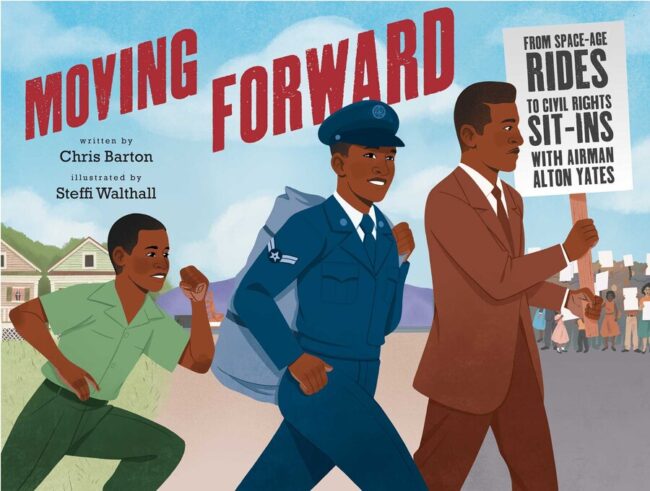
Moving Forward is about Alton Yates, a guy that I had heard of, but knew nothing about. Yates is a black man who grew up in Florida in 1960. His neighbor was a WWI veteran who would often tell him stories about combat but was frustrated about his treatment when he arrived home. Through that, as well as different influences and motivations, he was eager to join the Air Force in 1955.
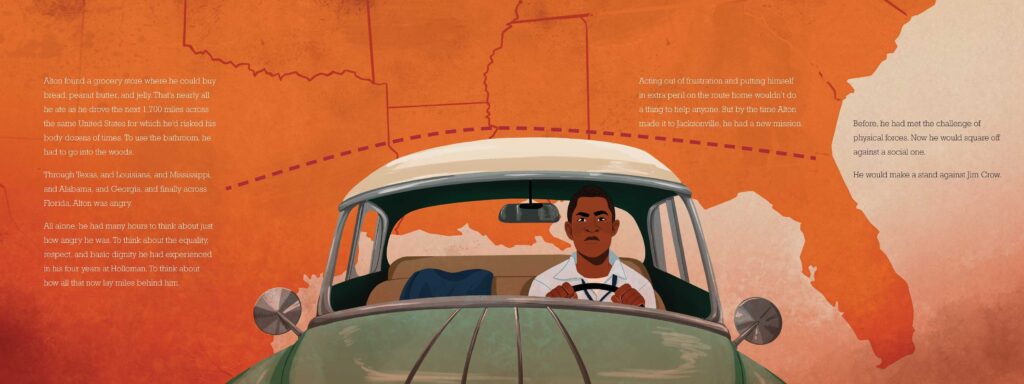
Yates had signed on to work under Lieutenant Colonel John Paul Stapp. He was the Fastest Man on Earth, conducting rocket sled trials in the New Mexico desert. They entailed traveling at hundreds of miles per hour and then stopping on a dime. With human space exploration and everyone owning a car soon, the military needed to see how those excessive speeds and their stoppage would affect our bodies. Alton volunteered to help out Stapp’s team, which meant a punishing, but rewarding experience.
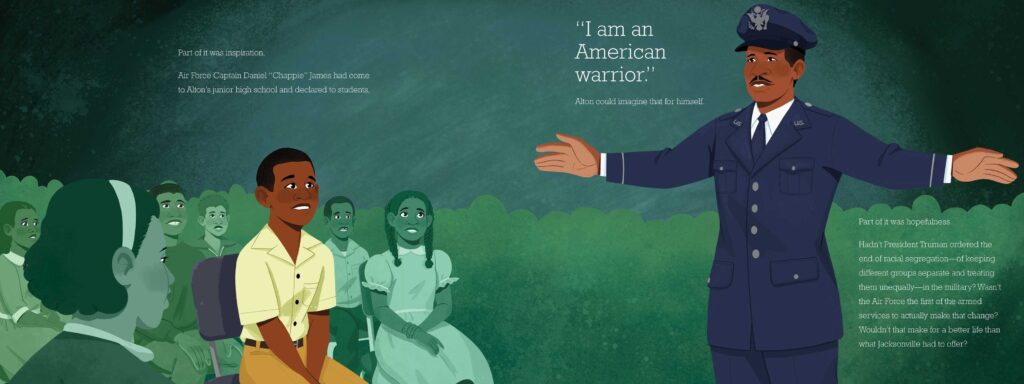
Shortly into the experiments, he received notice that his father was very sick. The Air Force granted him an honorable discharge and he was allowed to go back home to Florida to assist his family. On the drive back home he experienced stores that wouldn’t allow him to purchase food and places that he couldn’t eat at. Jim Crow was active in the southern United States and it was on the way back home that Alton Yates decided to do something about it.
He was only 23 when he became active in the NAACP Youth Council. They organized sit-ins at the white-only lunch counters. Those lunch places became so flustered because they couldn’t serve the Black customers, that they simply closed their establishments on those days. They were peaceful protests, but the white men who were used to things a certain way were not.
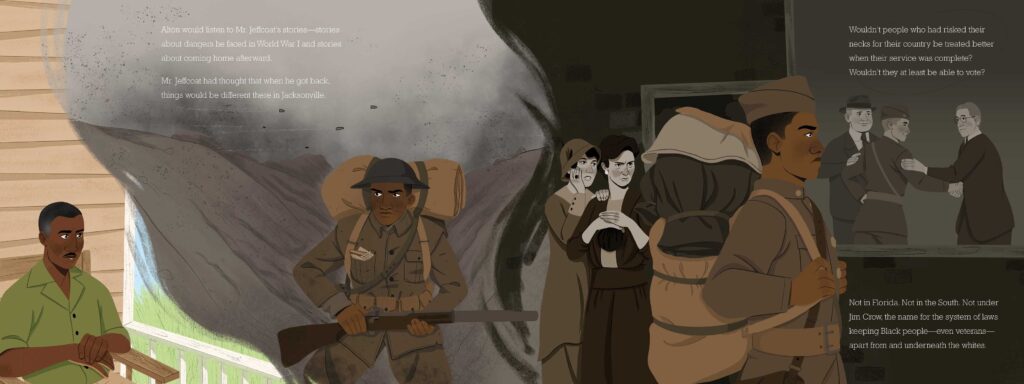
The book culminates in a massive protest in Jacksonville, Florida called Ax Handle Saturday. Yates and some friends went to the sit-in as they sometimes did, and were met with a hoard of men carrying baseball bats and ax handles. In the ensuing mêlée, Yates was struck on the back of his head, where the scar still exists today.
The illustrations in Moving Forward are by Steffi Walthall. They’re realistically drawn and provide the drama and adventure that one would associate with a life such as Yates’. The text is by Chris Barton and is succinct enough to give elementary school ages the information that they need. Some aspects of the book those fifth-grade students haven’t had much experience with, like Jim Crow and riots. Moving Forward presents everything at a level that those eleven-year-old kids are able to read by themselves and think about.
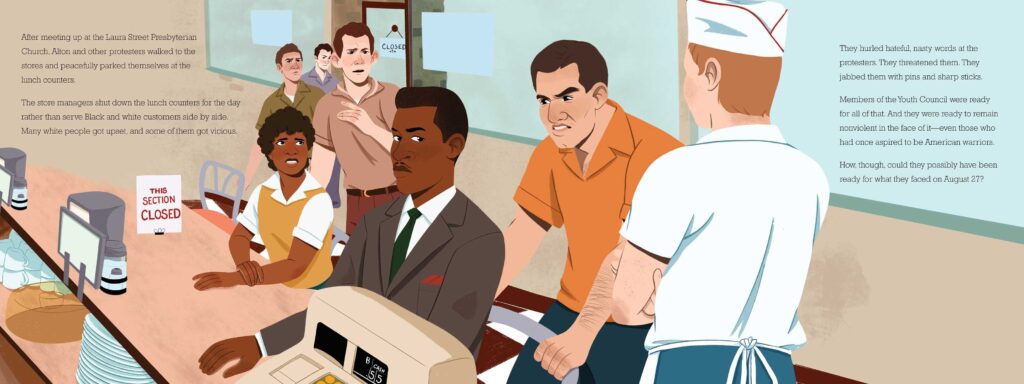
They won’t know all of the issues, but that’s one of the great things about presenting kids with non-fiction literature. They’re able to ask questions, frame historical events in their minds, and dig into it more. Moving Forward also has a timeline, author’s notes, illustrator’s notes, sources, and a couple of real photographs on the back cover. It’s engaging non-fiction that entertains and educates with equal balances about a time period that those fifth-grade students will really start to learn about in the coming years. That’s important because kids won’t willingly seek out uncomfortable topics, but they need to learn how to talk about them, as well as the heroes that broke the molds.
Moving Forward: From Space-Age Rides to Civil Rights Sit-Ins with Airman Alton Yates is by Chris Barton with illustrations by Stefi Walthall and is available on Beach Lane Books, an imprint of Simon & Schuster.
There are affiliate links in this post.

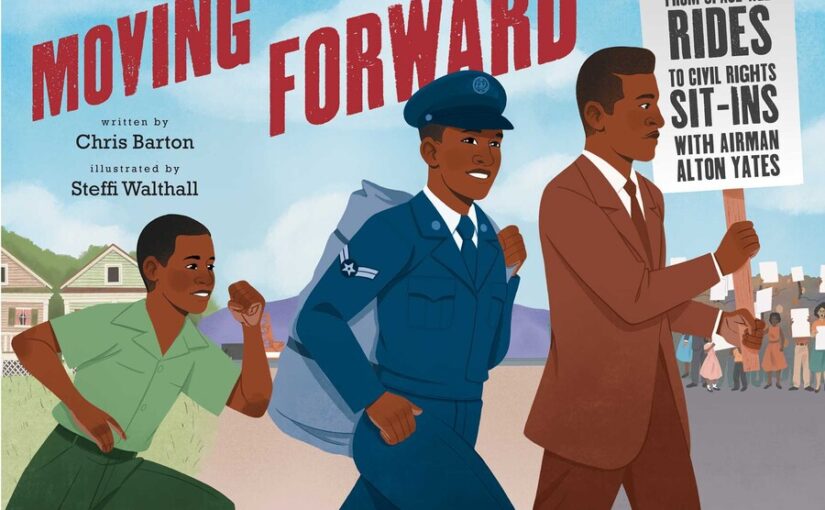



 Facebook
Facebook Twitter
Twitter Flickr
Flickr GooglePlus
GooglePlus Youtube
Youtube